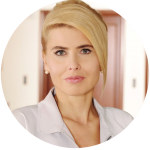General anaesthesia is a solution that finds its purpose in dentistry for over 150 years. It is worth deciding for it if we do not want to receive most of the inconveniences accompanied by the treatment, or if we are planning both extensive surgical treatment and interdisciplinary treatment (e.g. teeth extraction, implanting and adding temporary prosthetic restoration). It is also the ideal way of taking care of uncooperative patients (children, mentally disabled people, patients with birth defect or with retching reflex). In spite of social belief that narcosis is dangerous, in fact it is safe solution – properly qualified patient and properly done general anaesthesia does not leave any side effects.
When you should not use general anaesthesia?
General anaesthesia must not be used on patients that suffer from serious diseases that belong to ASA III group and higher. Active infections, illnesses uncompensated therapeutically (e.g. arterial hypertension, pregnancy, period, obesity or alcohol abuse) are relative contraindication that does not disqualify a patient for a narcosis. In those cases doctor decides whether or not a patient could be treated in general anaesthesia.
If not narcosis, then what?
If general anaesthesia is not advisable we have other options of eliminating the pain. In dentistry we can use regional anaesthesia. It might be applied in a form of spray, gel or an injection, with injection a dentist can do infiltrative anaesthesia or block anaesthesia. These types of anaesthesia allow us to perform most of ambulatory surgeries. Patient does not feel pain but is conscious of everything, the noise, smell, inconviniences, that might be not widely accepted by patients. Sedation on the other hand lets us to eliminate the fear, pain and panic. It causes calmness, unconsciousness.
Mieszkam i pracuję w Warszawie. Praktykę lekarską prowadzę od ponad dwudziestu lat. Jestem współwłaścicielką kliniki stomatologicznej Trio-Dent, gdzie leczę pacjentów, prowadzę badania naukowe, ale też udzielam pomocy osobom, które jej potrzebują.


